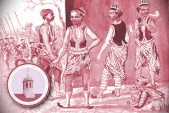IV.1 Urban Boards, Public and Religious Order

Public administration and law and order were also directly supported by several local notary (lawyer’s) offices, producing thousands of wills, contracts, agreements, affidavits and so forth. A District Council supervised the Environs of the city. Both the College of Aldermen and the District Council divided the city into blocks and neighbourhoods, each under its own head. A meticulous population administration helped to maintain a good overview of the multitude of different ethnic groups.
The Batavian Church Council administered four churches which together had some 5,000 members by 1700. Superintending private and public behaviour and maintaining strict norms, religion played an important part in the process of local Christianization and moral discipline. Muslim activities are more difficult to trace in the documents, but undoubtedly among the ninety percent of the population who was Asian, Islam was an important force, in particular, among the people living in the Batavian Environs. The majority of the Chinese maintained their own Buddhist and Taoist rituals. Together with their shadow plays, these rituals were often publicly enacted in the streets of Batavia.




